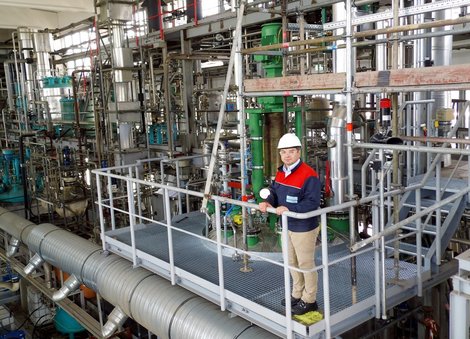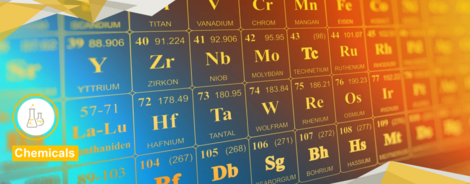The Scent of Innovation

The fine chemicals company in Bitterfeld-Wolfen Chemical Park develops and produces aromas and fragrances as well as the accompanying synthesis processes. The medium-sized business carries out research and produces products for both in-house and contracted projects.©IMG Saxony-Anhalt
Miltitz Aromatics GmbH in Chemical Park Bitterfeld-Wolfen is one of the world’s most in-demand manufacturers of aromas and fragrances
“We sell smells,” says company co-founder Dr. Peter Müller, who was managing director for many years. His son Dr. Stefan Müller, now the current managing director, happily gives his own insight, too: “Just as a painter needs a supplier for their paints, we supply perfumers.” The company’s extensive portfolio includes around one hundred products based on fine chemicals, from traditional perfumery components to agrochemical intermediates.
The company’s relocation from the eponymous Miltitz to the Chemical Park Bitterfeld-Wolfen , one of the twelve Centers of Excellence in Saxony-Anhalt, is testament to the excellent intuition of the company management over the past 30 years. Stefan Müller values the superb infrastructure at this long-standing chemical park in Central Germany, which includes a sewage works, roads and a supply of steam, compressed air, gas and hydrogen. “We now see this infrastructure as a matter of course, but of course, it isn’t,” says Stefan. He says the site is also within a short distance of the chemical park’s management and other companies. The park boasts many businesses in the chlorine, speciality and fine chemicals sectors as well as manufacturers of pharmaceuticals and high-tech products. It is where small and medium-sized companies feed off each other’s success. Logistics providers and other service providers top off the park’s profile, making the most of the industrial site’s location in the road and railway network.
Inquiring minds perfecting processes
Some 100 Miltitz Aromatics customers in more than 30 countries benefit from the pooled knowledge, experiences and inquiring minds of the company’s 45 employees and seven apprentices. Since it was founded 28 years ago, Miltitz Aromatics has always attached great importance to further training and learning. Twelve university-trained chemists and lab technicians in the research department are working on creating not just new scents, but also new and more efficient processes to make scents and other fine chemicals. Stefan says that process development is becoming an ever-greater preoccupation for them. The sale of expertise has been increasing over the past two years, and Miltitz Aromatics’ steadily growing reputation has made no small contribution to this.
“Word has now got around at an international level that the long-standing chemical triangle in Saxony-Anhalt can provide solutions from a single source,” says Stefan. He also talks about his involvement with the biochemistry cluster, explaining that Miltitz Aromatics benefits from the collaboration in this field, which is set to be expanded further with support from the state of Saxony-Anhalt. What’s more, the company’s substance purification has proved it to be an excellent partner. He maintains that there is a great biotechnology network in Saxony-Anhalt that includes the Fraunhofer Center for Chemical-Biotechnological Processes CBP in Leuna and a research institute that Miltitz Aromatics actively works with. “Saxony-Anhalt supports collaboration and promotes rapid implementation,” emphasizes Stefan. He also gratefully acknowledges the recognition and support from the Chemical Park Bitterfeld-Wolfen as a Center of Excellence in Saxony-Anhalt.
Miltitz Aromatics provides fragrances that we all come into contact with on a daily basis in detergents and other household chemicals. Stefan likes to use this as an example to bring the world of chemistry closer to students. The company has been working closely with universities for a long time. It does a lot of work with the nearby Merseburg University of Applied Sciences in particular, which specializes in chemistry and automation engineering. This makes it a good fit for Miltitz Aromatics’s profile both in terms of developing new products and optimizing processes. It has sponsored many students to write their bachelor’s and master’s dissertations at the company on a particular topic. “We have even supervised PhD students from the Leibniz Institute for Catalysis in Rostock.”
An ambergris fragrance for the world market
The company’s process for synthesizing hydroxyambran, an ambergris fragrance, is a world first. “We are proud that it is unique to us. It is a popular substance to add to detergents as it stays on fibers for a long time. Customers like that,” explains Stefan.
Production technologies
Miltitz Aromatics produces a variety of aromas and fragrances in its plants. Its flexibility is an advantage, but also brings with it complexity and requires special expertise and equipment in order to guarantee the necessary purity. This quality, together with annual production volumes of up to 200 tonnes, which is relatively high and by no means common for the fine chemicals sector, has allowed Miltitz Aromatics to find its niche in the world market. The company has also systematically expanded its core competency: hydrogenation. Stefan is proud of its processing of isoprenes – another selling point that sets the company apart: “Not many people are up to taking on dimerization and trimerization, which involves joining the isoprene molecules to only short chains; we are very good at it.”
Researching green synthesis gas
For a few years, Miltitz Aromatics has been researching hydroformylation and aims to occupy another niche by using green synthesis gas. “We want to use the carbon dioxide from sewage treatment plants. It’s possible – but we will develop it further in view of the scales we work with. Large plants operate differently to our small plants, and the same goes for our laboratory facilities. We also enable our customers to have this experience,” says Stefan, giving an example of their close, personal contact with their partners. This is another building block to add to the fragrance manufacturer’s success.
Author: Renate Wähnelt/IMG Saxony-Anhalt
HERE the chemistry is right.

Traditionally, Saxony-Anhalt offers the complete value chain from basic chemicals to the processing industry. In the fields of polymer synthesis, agrochemicals as well as fine and specialty chemicals, the state has developed into a leading competence center. A distinctive raw materials network, supported by the state's 5 chemical parks, creates profitable synergy opportunities.
